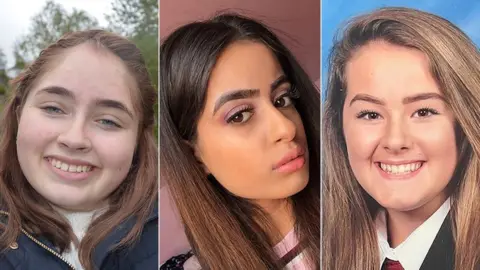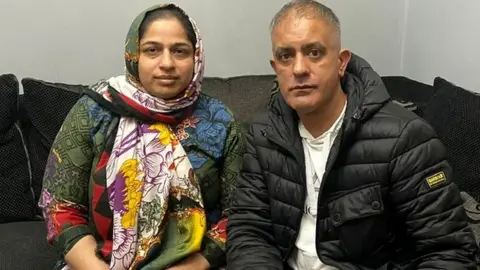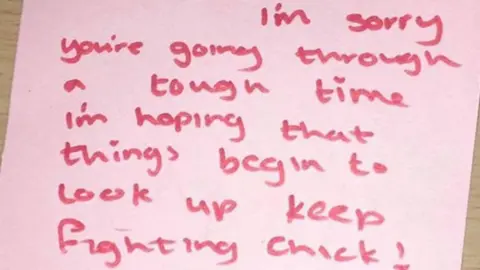West Lane Hospital: Stop treating patients like animals, family say
 Family photograph
Family photographThe family of a girl who died amid a string of mental health failures have called for changes so patients are not treated like "locked-up animals".
Nadia Sharif, 17, from Middlesbrough, took her own life at West Lane Hospital in 2019, two months after another teenager, Christie Harnett, died.
The 17-year-old had written notes of support to Miss Sharif, which their families agreed to share with the BBC.
Her younger sister Anem said she wanted further investigations to take place.
It follows three hard-hitting reports published as part of a NHS England-commissioned inquiry into the treatment of Miss Sharif, Miss Harnett, and former patient, 18-year-old Emily Moore.
All three were being treated by Tees, Esk and Wear Valleys NHS Foundation Trust (TEWV) when they took their own lives.
 Watson Woodhouse
Watson Woodhouse"I thought she was in that hospital being cared [for] and looked after - but actually, the reality was it was the opposite," Anem Sharif told BBC Radio Tees.
"They need to train staff, they need to look after patients and not treat them as if they are animals locked inside.
"I feel like if this was a normal hospital it would have been dealt with so severely but - when it's a mental hospital - no-one is looking into it as deeply as they should."
The report laid bare 120 failures the three encountered - 45 alone across several agencies regarded Miss Sharif, who had previously been diagnosed with Asperger's/autism spectrum disorder (ASD).
An investigation found:
- Miss Sharif had been restrained inappropriately twice, with CCTV footage showing her "dragged" down a corridor backwards.
- A lack of autism awareness and a "missed opportunity" to provide training for staff.
- Care plans that expected the teenager to "earn" access to her own clothes.
- Plans written in the first person, including language 'highly unlikely to be used by a teenager', with no evidence the patient had written them.
- TEWV staff continued to contact her parents after she took her own life, despite being asked not to.
- Her mother - whose first language is not English - was not included in discussions about her care, with an "assumption" made family members would interpret.
Miss Sharif's father Hakeel said the family had been "let down" and he was shocked by "so many failures".

"There are so many errors, they made a mistake so many times," he said.
"Nobody was trained for autism. Every time they were saying, she's not in the right place.
"It should be done properly, train their staff, they just let her down."
He called for interpreters to always be available for people who needed them.
- If you've been affected by issues in this article there is help and support at BBC Action Line
Miss Shariff received a letter of support from Miss Harnett during their treatment, and all three young women struck up a friendship.
She wrote: "I know right now things are really tough for you but I would just like to say they'll get better."
 Sharif family
Sharif familyAnother note read: "I'm really hoping things begin to look up. Keep fighting chick!"
Miss Sharif's sister - who is now 17 herself - remembers her sister as "the most outgoing girl" who liked to shop and take selfies with her.
 Anem Sharif
Anem Sharif"I feel I just want to reach my full potential because she can't now," she said.
"She hasn't been able to see me grow, I passed my exams and she didn't get the chance to do that.
"She had a voice even though it was shut down - I feel people should look up to that, if there's a problem speak up about it. Even at her worst time she tried to get her voice heard."
West Lane Hospital, which closed in 2019 following the deaths, provided specialist child and adolescent mental health services (CAMHS), including treatment for eating disorders.
It has since reopened under a new name, with specialist services for children and young people run by a different health trust.
After the three reports were released on Wednesday, the Tees, Esk and Wear Valleys NHS Foundation Trust (TEWV) admitted the hospital had "unacceptable failings" and apologised unreservedly.
The government also apologised for "the failings in the care that they received."

Follow BBC North East & Cumbria on Twitter, Facebook and Instagram. Send your story ideas to [email protected].
